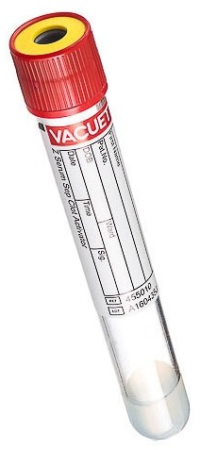
Test Code: 822
CPT Code(s): 84450
Includes: AST
Methodology: Spectrophotometry (SP)
Clinical Significance: AST is widely distributed throughout the tissues with significant amounts being in the heart and liver. Lesser amounts are found in skeletal muscles, kidneys, pancreas, spleen, lungs, and brain. Injury to these tissues results in the release of the AST enzyme to general circulation. In myocardial infarction, serum AST may begin to rise within 6-8 hours after onset, peak within two days and return to normal by the fourth or fifth day post infarction. An increase in serum AST is also found with hepatitis, liver necrosis, cirrhosis, and liver metastasis.
Alternative Name(s): AST, SGOT
Supply: #T157 - Red/Yellow SST 8mL
Preferred Specimen: Serum
Preferred Volume: 1mL
Transport Container: Serum Separator Tube (SST)
Transport Temperature: Room Temperature
Specimen Stability: Room Temperature: 4 days
Rejection Criteria:
- Hemolysis
- What are hemolyzed specimens?
- Hemolysis occurs when the red cells are damaged during sample collection causing them to rupture. Hemolyzed serum or plasma is pale pink to red rather than the normal clear straw or pale-yellow color.
- What causes a specimen to be hemolyzed?
- Mixing tubes too vigorously
- Placing tubes in the refrigerator without allowing 30 minutes at room temperature for complete clotting
- Exposure to heat or in a refrigerator that is too cold
- Using a needle with too small of a bore necessary for the venipuncture
- Using too large a tube when using a butterfly needle
- Not allowing sufficient time for alcohol to dry on puncture site
- Leaving the tourniquet on for longer than one minute
- How can hemolyzed specimens be prevented?
- For routine collections, use a 20–22-gauge needle
- Do not remove the needle from the vein with the vacuum tube engaged
- Do not collect a specimen in a hematoma
- Do not centrifuge the specimen for a prolonged period of time
- Draw the sample gently and evenly
- What are hemolyzed specimens?
- Specimens exceeding stability
- Specimens other than serum
- Unlabeled or improperly labeled specimens
For additional supply or collection device information, please contact DLO's Customer Service at (800) 891-2917, option 2.
The CPT codes provided are based on AMA guidelines and are for informational purposes only. CPT coding is the sole responsibility of the billing party. Please direct any questions regarding coding to the Payor being billed.
